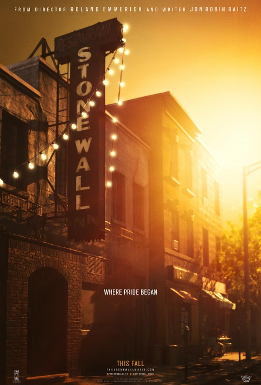The Stonewall riots of 1969 were a pivotal moment in LGBT history. These spontaneous, violent demonstrations in front of the Stonewall Inn in Greenwich Village, New York, were the boiling point for a community sick of being constantly dehumanized and kicked off the modern gay-rights movement. Creating a film about these events has been a long time coming for a community that has worked tirelessly since for gay rights.
Unfortunately, Stonewall is not that film. In fact, Stonewall is not even close to being that film. Instead, Stonewall is about Danny (Jeremy Irvine), a white, corn-fed all-American young boy who gets caught giving the quarterback a blow job and is kicked out by his head-football-coach father. Danny, the stereotypical golden boy in a tight white t-shirt and masculine good looks, ends up on Christopher Street and befriends a group of queer kids led by Ray (Jonny Beauchamp). Ray has quite the crush on Danny and seems to immediately worship Danny as a way to be saved from the streets. If that bit of White Savior nonsense wasn't enough, it's quickly made clear that it is downright silly that Ray thinks Danny would ever love the femme Latino. Particularly when you have Jonathan Rhys Meyers show up vying for Danny's attention in glorious seventies garb, like a strange fever dream I never knew I wanted.
Everything about Stonewall is clunky from the inept handling of the characters to the groan-inducing script to the downright terrible acting. Danny, a fictional addition to actual historical events, steals all of the limelight and glory away from the actual residents of Christopher Street. With his arrival, he incites everyone to action. At the pivotal moment before the riots begin, a black man actually hands over the first brick to Danny "“ a literal representation of deferring to the white man.
It's insane to watch. Here's a film about incredibly emotional and devastating topics, about the mistreatment and perseverance of a marginalized community. The film should have been a breeze to make "“ it screams Oscar fodder. And yet it was so laughably bad that I became angry that Emmerich couldn't even manage to make me cry. By the time we got two-thirds of the way through, I began to wonder how a film like this gets as far as opening in theaters. Surely, someone (even MULTIPLE) people must have raised alarms. How did this script get written, approved, get a director, get cast, shot, edited, etc. without anyone raising some flags? It's baffling.
I guess there's only so much you can expect from the director of Independence Day and The Day After Tomorrow. I just hope in the future Emmerich sticks to schlocky doomsday films and leaves the emotional storytelling to someone that won't manage to offend the very community it's trying to honor.

